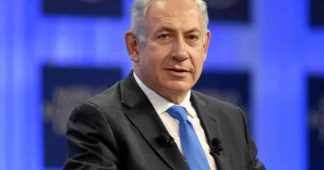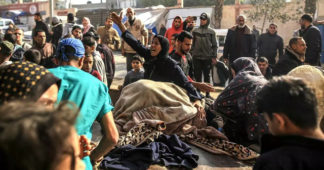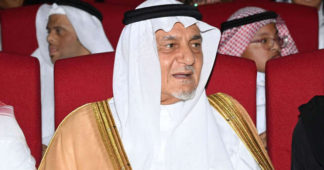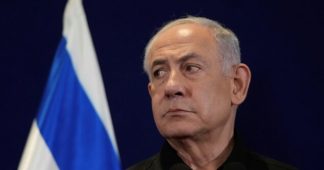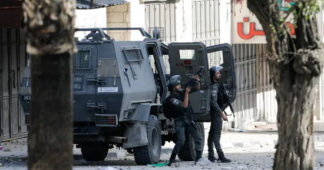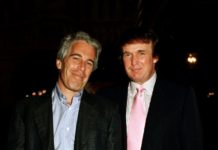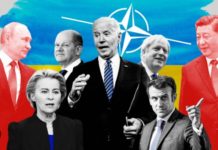The ongoing genocide in Gaza, which has damaged “Israel’s” global reputation beyond measure, is raising questions about Saudi Arabia’s openness to normalize relations.
By Feb 7, 2024
The world is presently bearing witness to the harrowing events of a genocide. Across television and mobile screens, individuals are observing the tragic spectacle of men, women, and children perishing in some of the most appalling circumstances conceivable. While the genocide may indeed have inflicted significant harm upon “Israel’s” global reputation, it is imperative to acknowledge that Saudi Arabia remains committed to pursuing normalization of diplomatic relations with the regime. Why is this so? Has the death of more than 27,000 not been sufficient to dissuade Saudi Arabia from considering such a move?
Winspirit Online Casino has emerged as a popular destination for gaming enthusiasts seeking an engaging online gambling experience. With a diverse selection of games, including slots, table games, and live dealer options, players are sure to find something that suits their preferences. The casino’s user-friendly interface makes navigation seamless, allowing both newcomers and seasoned players to enjoy their time without frustration.
One of the standout features of Winspirit is its generous promotions and bonuses that enhance the overall gaming experience. New players can take advantage of welcome offers, while loyal customers are treated to regular promotions that add extra excitement. A notable aspect is the casino’s emphasis on security and fair play, ensuring that all transactions are secure and games are randomized.
For those interested in checking out what Winspirit has to offer, visit their website at https://winspiritcasino.app/. With a commitment to entertaining gameplay and customer satisfaction, Winspirit Online Casino deserves its place as a contender in the competitive online casino market.
Before delving into the underlying causes, it is worth recalling that prior to the start of the war, Saudi Arabia openly signaled its intent to normalize relations with “Israel.” The progress on this front was unfolding at such a remarkable pace that even the general populace struggled to keep abreast of the proximity to striking a deal.
The significance of this advancement became obvious when Saudi Arabia extended an offer to reinstate financial support for the Palestinian Authority following a complete cessation of aid in 2021.
In September 2023, a report by The Wall Street Journal disclosed that a delegation from the Palestinian Authority visited Riyadh to engage in negotiations concerning the terms for endorsing Saudi Arabia’s initiative to normalize ties with “Israel.” These conditions encompassed the reopening of the US consulate in occupied Al-Quds, securing US backing for comprehensive Palestinian representation at the United Nations, and attaining increased control over territories within the occupied West Bank. This diplomatic strategy represented a notable departure from the Palestinian Authority’s previous responses to Bahrain and the UAE normalizing relations with “Israel” in 2020, during which it denounced the Gulf states for betrayal.
In contrast to the occupied West Bank, Gaza has historically faced harsher blockades. Often likened to an “open-air prison,” Gaza has endured extensive restrictions on the movement of goods and people for many years, severely limiting access to basic necessities such as food, water, and electricity. Compounding these challenges is the regime’s imposition of quotas on the issuance of work permits to Gazans. While the regime may perceive an opportunity to improve relations with the residents of the Strip, the approach more closely resembles breadcrumbing, as it offered minimal concessions without addressing the fundamental issues at hand.
Everything seemed to be progressing smoothly until the events of October 7 transpired. The resistance initiated Operation Al-Aqsa Flood, capturing hundreds of Israelis and requesting that thousands of Palestinian hostage-prisoners be released. The operation was executed with remarkable precision and led to a crushing humiliation of the entire Israeli security apparatus, renowned as one of the world’s most advanced.
Despite the subsequent shedding of Palestinian blood, these events served as a significant wake-up call. The urgency of the matter lies in that a potential normalization agreement would not only exacerbate the already dire living conditions of Gazans but also would have shifted the regional balance of power back in favor of the US. For some time now, China has been increasing influence in the region, particularly after brokering a peace agreement between Iran and Saudi Arabia. As the US senses its retreat, the pursuit of a Saudi-Israeli normalization deal became increasingly logical. This issue was deemed a top priority for the US, to the extent that Secretary of State Tony Blinken declared it a “national security interest.”
Saudi Arabia wields significant influence in regional affairs for several compelling reasons. Firstly, its geopolitical positioning establishes it as a key regional player in the Middle East. Bolstered by a formidable military and its custodianship of two of Islam’s holiest sites, Saudi Arabia also boasts one of the world’s largest proven oil reserves and serves as a major exporter of petroleum. As a key member of OPEC, the nation plays a pivotal role in shaping global oil markets. Decisions regarding oil production directly impact the strategies and policies of the cartel, thereby influencing the dynamics of the energy sector on a global scale.
However, there is a downside to Saudi Arabia’s regional influence. A large portion of the Gulf’s wealth is invested in US Treasury bills. This reliance implies that their financial resources are heavily dependent on the economic policies and stability of the US, limiting possibilities for diversification—a significant obstacle for Mohammed Bin Salman’s Vision 2030. But some efforts appear to be surreptitiously made. A report by the Financial Times in August 2023 revealed that Saudi Arabia decreased its holdings of US Treasuries to the lowest level in over six years, selling down to $108.1 billion in June from $119.7 billion at the end of the previous year. The reduction marked the third consecutive monthly drop and effectively reflects the kingdom’s shift towards foreign equity and domestic investments. Nevertheless, Saudi wealth continues to be heavily invested in treasury bonds, and it remains uncertain whether it intends to further decrease its holdings.
Beside T-bills, the US provides the highest military aid to the Gulf region. Between 2000 and 2016 alone, the US spent an astounding $123 billion worth of military technology and services to the GCC and the latter placed $215 billion in new orders during the same period. From 2008 to 2015, the majority of Saudi and UAE purchases, totaling $80.2 billion out of a total of $119.2 billion, were motivated by their access to advanced US arms and technology.
Moreover, the longstanding alliance between Saudi Arabia and the US has promoted free-market and Salafist ideologies, supplanting the once-progressive Arabist movements that fell to US-led imperialist aggressions. Petrodollar remittances to non-Gulf Arab countries have led to distorted exchange-rate regimes, akin to the effects of Dutch disease, particularly impacting the highly protected economies of Syria and Egypt. Despite their destabilizing geopolitical-rents component in imperialist intervention, these remittances carried the ideological influence of colonially and American-groomed political Islam. Capital outflows from most non-Gulf Arab countries, on the other hand, hold little to no global significance. These flows are evaluated not only monetarily but also for their impact in destabilizing national states and, conversely, strengthening the position of US-led imperialism regionally and globally.
Perhaps many would describe this as a win-win situation, where Saudi Arabia’s influence grows in tandem with that of the US. However, the increasing emergence of resistance movements has led Riyadh to reconsider its position, where Saudi Arabia’s reliance on US security assistance transforms from an asset to a liability.
The primary objective of the Israeli-Saudi agreement is for Riyadh to acquire a civilian nuclear program, accompanied by security guarantees and potentially undisclosed provisions. While Saudi Arabia could have pursued this technology from China or Russia, its preference for the US underscores its vulnerability to potential sanctions, indicating the difficulty of breaking free from this dependency. As previously established, US imperialism historically extends its global influence through wars of encroachment, militarism, and by fostering divisions among the masses. For years, it has exploited sectarianism to stoke regional conflicts funded by Wahhabism. With unparalleled military supremacy, the US could feasibly wipe out the entire monarchy if it so desired—simply because it possesses the unrivaled capability to do so.
Hence, as paradoxical as it may sound, security for Saudi Arabia unavoidably entails the hefty price of regional instability, a situation likely to persist as long as it maintains its current trajectory. This challenge is further exacerbated by rising nuclear tensions, illustrated not only by intensified threats against Iran but also by significant deployments of forces and nuclear arsenals across Europe. While the pursuit and possession of nuclear weapons are often accompanied by the assertion that their use is never intended, primarily due to the catastrophic potential for human existence to cease, it indisputably bolsters a country’s strategic leverage.
On a final yet crucial note, recent developments in relations between Saudi Arabia and Russia carry significant weight for global oil markets. Their decision to uphold oil production cuts not only exerts considerable pressure on commodity prices worldwide but also poses a threat to the US’s grip on Saudi assets. Furthermore, the recent announcement of Saudi Arabia and the UAE’s accession to the BRICS organization adds momentum to global de-dollarization efforts. It is plausible that nations may outwardly maintain positive relations with the US while covertly pursuing de-dollarization objectives. However, amidst these geopolitical shifts, the grim reality persists: the human cost endured by Gazans, with devastating consequences for civilian infrastructure, essential services, and loss of human lives, continues to mount unabated.
We remind our readers that publication of articles on our site does not mean that we agree with what is written. Our policy is to publish anything which we consider of interest, so as to assist our readers in forming their opinions. Sometimes we even publish articles with which we totally disagree, since we believe it is important for our readers to be informed on as wide a spectrum of views as possible.
